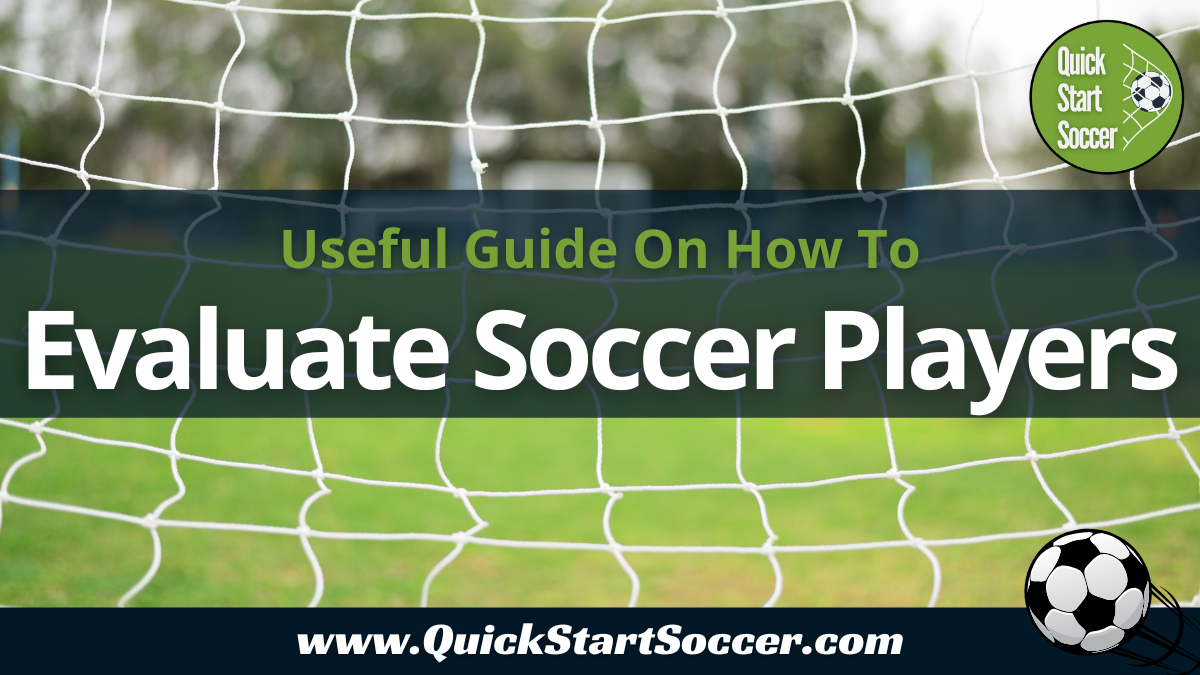How To Evaluate Soccer Players Properly | A Useful Guide
As a soccer coach, one of your most important responsibilities is to evaluate players properly. You may start by evaluating soccer players at tryouts, but it doesn’t end there! Once a player is on your team, you will need to regularly evaluate them to assess their progress and identify the areas they need to work on. But how do you properly evaluate players? Below we will walk you through how to evaluate soccer players and the key things you should include in your evaluation.
How To Evaluate Soccer Players
Evaluating soccer players is much more than seeing who scores the most goals or makes the most passes. A proper evaluation should assess a player’s technical and tactical skills, as well as their physical fitness and psychological attributes. When evaluating players, be sure to break down each of these categories in turn so both you and the player can have a full, holistic understanding of their strengths and weaknesses.
Why Evaluate Soccer Players
At tryouts, the obvious reason to evaluate players is to help choose the most appropriate players for your team. But this is not the only time you should be evaluating your players. Evaluation is an ongoing process that takes place each and every practice and game. In addition to this, the vast majority of youth soccer clubs now require coaches to give formal player evaluations at least twice a year. They do this in order to track players’ progress, ensure they are on the correct level team, and help highlight what skills or traits each particular player needs to work on.
What To Include In Your Player Evaluation
A thorough soccer player evaluation should assess a player’s technical skills, tactical knowledge, and physical fitness. In addition, players should be evaluated on their psychological attributes, such as their character, attitude, and desire to compete and play. Although what to include in a player evaluation varies by age and level, here is a detailed breakdown of the areas you should consider including in a full soccer player evaluation.
Technical Skills
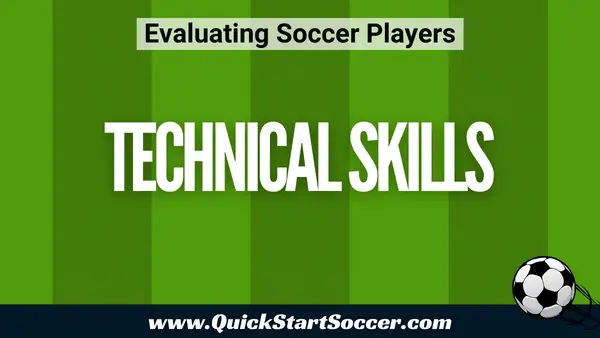
Dribbling And 1v1 Attacking
Is the player comfortable dribbling and moving with the ball at their feet? If so, can they do it while under pressure from an opponent? There are plenty of dribbling moves and skills out there (such as the scissors and the Matthews), and a good player should have at least one or two in their locker that they can successfully execute in a match situation when dribbling against an opponent.
Strength On The Ball
Does the player lose the ball every time they are under pressure? Or does he/she retain the ball and manage to hold off their opponents while deciding whether to pass, dribble or shoot? Maintaining strength on the ball is a vital tool for any player wanting to help their team maintain possession and create chances in the final third.
Passing The Ball
Can the player pass the ball using both feet and a variety of techniques? Do they have a high pass completion rate or a low one? Are they comfortable passing over long distances (e.g., with lofted and driven passes) or just short ones? In a team game, passing the ball is one of the most frequent actions an individual can take, so evaluating a player’s technique in this area is a must!
Winning Balls On The Ground And In The Air
Does the player seek out challenges and try to take possession of their opponents by making tackles and timely interceptions? Or are they shy and timid and avoid 1v1 duels wherever possible? When the ball is in the air, do they attack it and make sure they are first to the ball or wait for it to bounce and see where it lands? How a player wins and competes for balls on the ground and in the air is an area well worth evaluating and considering for players of all ages.
Finishing Ability
What’s the best and most exciting part of soccer? Scoring goals, of course! Players love working on shooting above all else and will welcome feedback on how to improve in this area. When evaluating a player in this area, be sure to check if the player makes good decisions in front of the goal. Are they able to finish chances using various techniques and with both feet and their head? Or do they often miss the target or struggle to beat the keeper?
Heading Ability
Once a player is 12 years old, they are permitted to head the ball in practice and games. Is the player comfortable heading the ball and meeting it in the air? Do they keep their eyes open and attack it or try to avoid contact at all costs by flinching or ducking away from the ball? If they are comfortable heading the ball, do they use their arms to protect themselves as they rise and meet it? These are all areas to consider when evaluating players’ heading ability in the game of soccer.
Tactical Skills
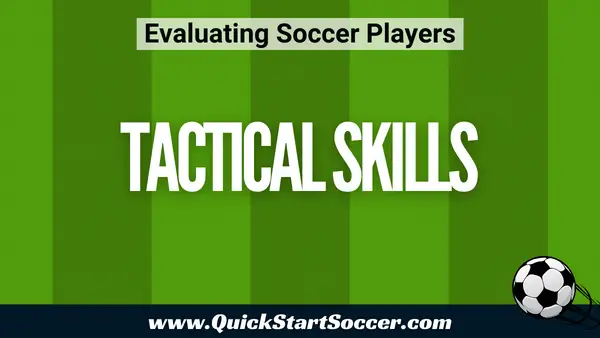
Penetrative And Creative Passes
Does the player consistently look for penetrative passes behind the opponent’s defense in order to create chances and score, or do they play it safe and try to keep possession above all else? As a coach, you will likely want some players to take more risks than others but evaluating everyone’s ability, strengths, and weaknesses in this area is a must!
Penetrative And Creative Runs
A player’s ability to make penetrative runs behind the defense is an equally important area to evaluate, particularly for forwards and attack-minded players. Does the player recognize when to make the run and how to avoid being offside? Are they able to read the body language of their teammates and pick up the visual cue of when they are likely to play that key pass?
Angles And Distance Of Support
When helping their team maintain possession of the ball, does the player take up good angles of distance and support? Are they able to create a ‘green highway’ between themselves and the person on the ball to present a clear and visible option? Or do they ‘hide’ behind other players and rarely find themselves in good positions of support?
Transitions
How does the player react when possession is won or lost? Are they quick to switch between their defensive & offensive roles, or do they react slowly and find themselves playing catch-up? Coaching players about transitions in soccer is incredibly important, so if players lack knowledge and skill in this area, be sure to include it in your evaluation so they can work on this important aspect of the game.
Switching The Play
Is the player able to recognize when a defense is organized and balanced and a quick switch of play may be advantageous? Do they make good and consistent decisions on when to attack quickly and directly and when to maintain possession and move the ball to move the defense?
Counter Attacking
Is the player able to recognize moments when a quick and swift counterattack can be utilized to get behind an overcommitted opponent? Are they able to execute the counterattack by combining with others and attacking at speed?
Defending As A Unit
Does the player understand the basic principles of pressure, cover, balance, and support? Are they able to take appropriate positions to help deny penetration and assist in the team winning the ball back through timely tackles and interceptions?
Physical Fitness
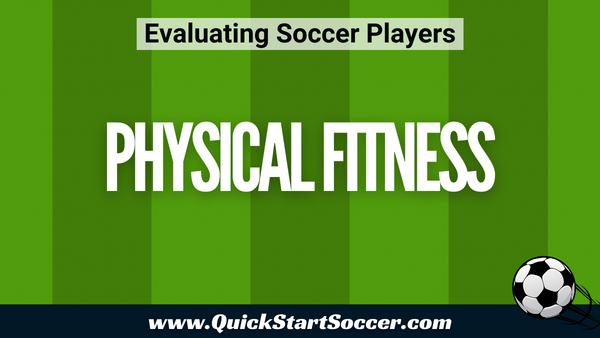
Stamina
Can the player compete at high intensity throughout the whole game, or do they often request to be subbed out or need to take a rest? Are they able to keep up with play and contribute when the team is in and out of possession?
Speed
Is the player able to move quickly both with and without the ball over short and long distances? Can they accelerate quickly and use it to optimal effect to beat a player to the ball or move past an opponent? When defending, does their pace allow them to catch up with an attacker and prevent goalscoring opportunities?
Strength
Is the player able to compete in 1v1 duels, or do they get they pushed off the ball easily? Are they fully committed in 50/50 challenges and often come out on top, or do they tend to lose the ball and be timid against more physical opponents?
Psychological Traits
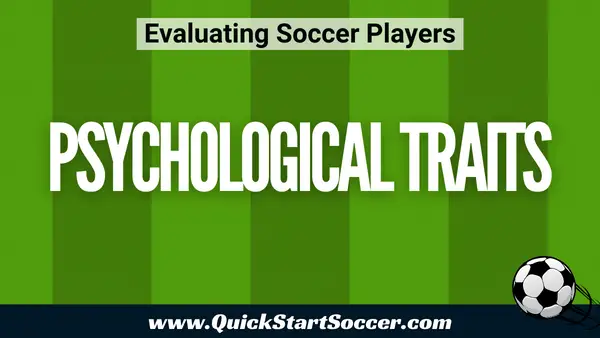
Attitude
How does the player behave at practice and in games? Do they always give 100%, no matter the activity and opponent? How do they react to adversity and when things go wrong? Do they demonstrate consistent respect for their teammates, opponents, the referees, and their coach?
Leadership
Does the player demonstrate leadership on the field through both their actions and words? Do they help to hold players accountable whilst maintaining a positive and productive relationship at all times?
Coachable
Is the player eager for instruction, and do they ask questions regarding their own development? Can you visibly see them trying to impose and apply the coaching points you provide?
Communication Skills
Do they use both verbal and visual communication on the field to help organize themselves and their teammates? Do they offer encouragement to others, particularly in moments of adversity?
Wrapping Up
Evaluating soccer players is no easy task, but if done properly, your players will quickly progress, and your team as a whole will improve. Although time-consuming, conducting formal evaluations can be an incredibly motivating process for the players themselves and help enormously in their development as players and people. Before you go, check out this Soccer Player Evaluation Form you can use to evaluate players, and don’t forget to check out our library of free soccer drills for inspiration for your next coaching session.

